Comparing Management Accounting in Australia and China
VerifiedAdded on 2023/01/16
|7
|1860
|85
Essay
AI Summary
This essay provides a comprehensive comparison of management accounting practices in Australia and China. It begins by defining strategic management accounting (SMA) and its importance, highlighting tools like target costing and activity-based costing. The essay then contrasts the management accounting approaches in the developed country of Australia, which utilizes advanced techniques like activity-based costing and target costing, with the developing country of China, which often employs traditional methods like standard costing and job order costing. The analysis explores the reasons behind these differences, considering factors like financial development and adaptability to new technologies. The essay concludes by emphasizing the crucial role of management accounting in effective business management and decision-making, underscoring the benefits of adopting appropriate practices for organizational growth. The essay references several academic sources to support its arguments.
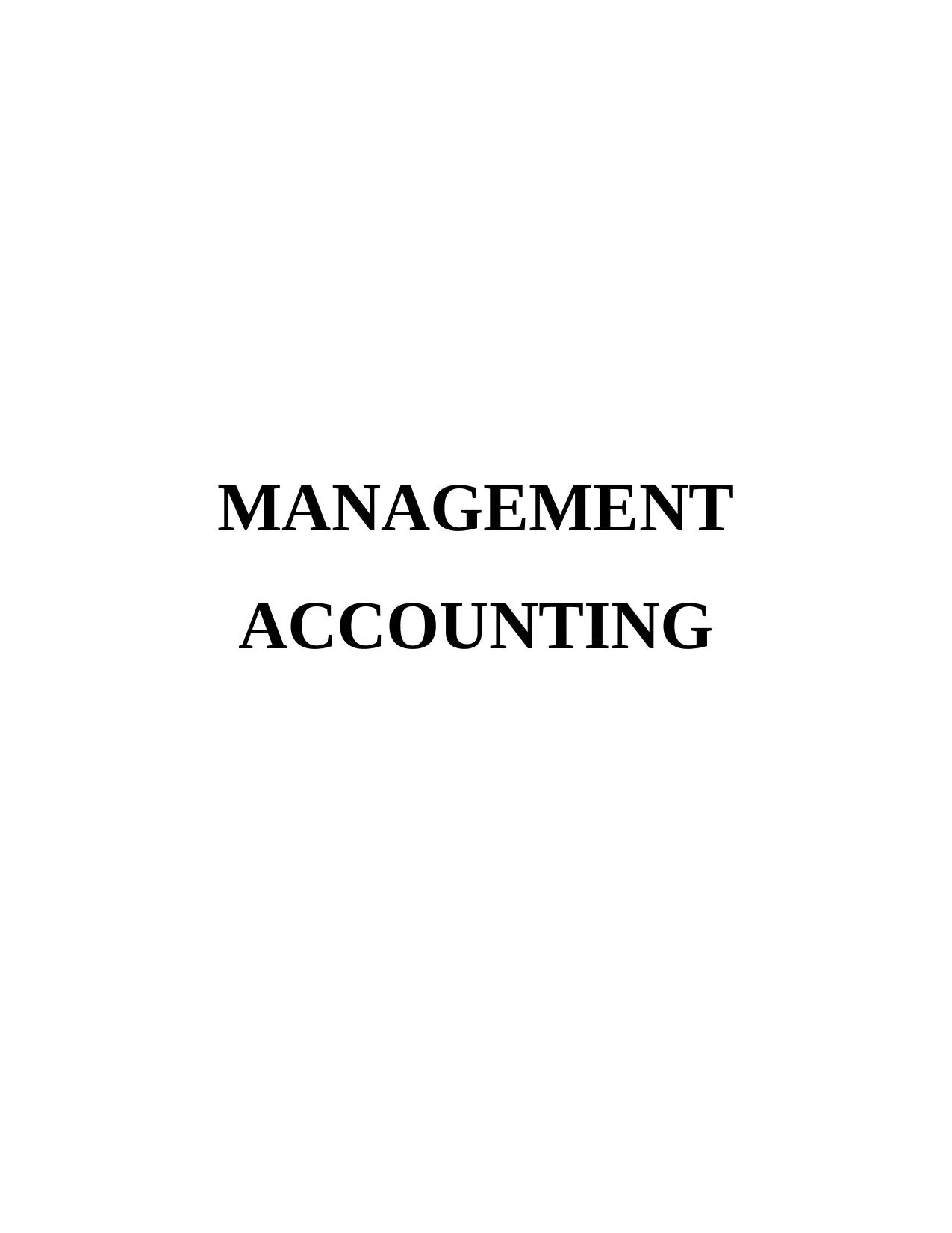
MANAGEMENT
ACCOUNTING
ACCOUNTING
Paraphrase This Document
Need a fresh take? Get an instant paraphrase of this document with our AI Paraphraser
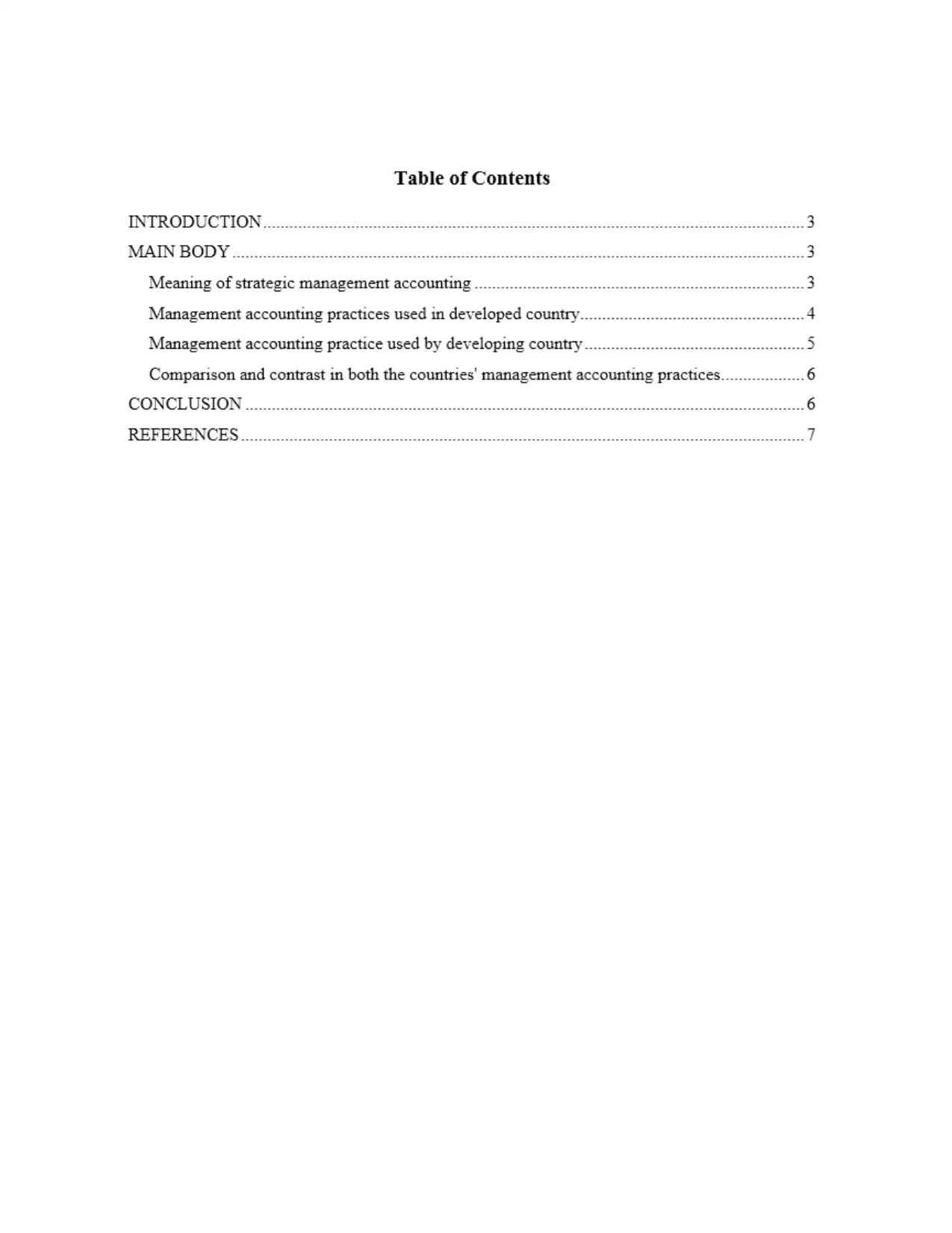
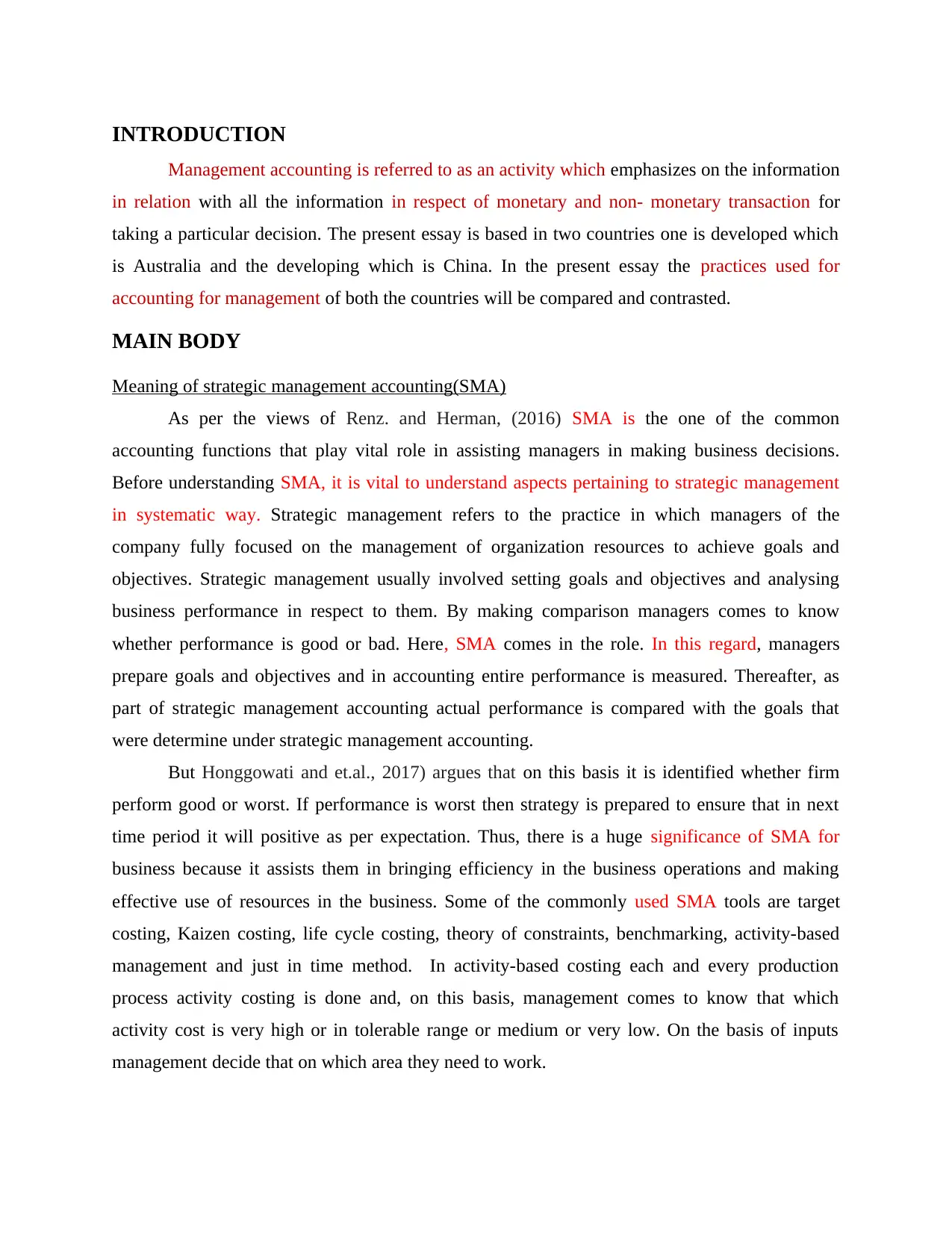
INTRODUCTION
Management accounting is referred to as an activity which emphasizes on the information
in relation with all the information in respect of monetary and non- monetary transaction for
taking a particular decision. The present essay is based in two countries one is developed which
is Australia and the developing which is China. In the present essay the practices used for
accounting for management of both the countries will be compared and contrasted.
MAIN BODY
Meaning of strategic management accounting(SMA)
As per the views of Renz. and Herman, (2016) SMA is the one of the common
accounting functions that play vital role in assisting managers in making business decisions.
Before understanding SMA, it is vital to understand aspects pertaining to strategic management
in systematic way. Strategic management refers to the practice in which managers of the
company fully focused on the management of organization resources to achieve goals and
objectives. Strategic management usually involved setting goals and objectives and analysing
business performance in respect to them. By making comparison managers comes to know
whether performance is good or bad. Here, SMA comes in the role. In this regard, managers
prepare goals and objectives and in accounting entire performance is measured. Thereafter, as
part of strategic management accounting actual performance is compared with the goals that
were determine under strategic management accounting.
But Honggowati and et.al., 2017) argues that on this basis it is identified whether firm
perform good or worst. If performance is worst then strategy is prepared to ensure that in next
time period it will positive as per expectation. Thus, there is a huge significance of SMA for
business because it assists them in bringing efficiency in the business operations and making
effective use of resources in the business. Some of the commonly used SMA tools are target
costing, Kaizen costing, life cycle costing, theory of constraints, benchmarking, activity-based
management and just in time method. In activity-based costing each and every production
process activity costing is done and, on this basis, management comes to know that which
activity cost is very high or in tolerable range or medium or very low. On the basis of inputs
management decide that on which area they need to work.
Management accounting is referred to as an activity which emphasizes on the information
in relation with all the information in respect of monetary and non- monetary transaction for
taking a particular decision. The present essay is based in two countries one is developed which
is Australia and the developing which is China. In the present essay the practices used for
accounting for management of both the countries will be compared and contrasted.
MAIN BODY
Meaning of strategic management accounting(SMA)
As per the views of Renz. and Herman, (2016) SMA is the one of the common
accounting functions that play vital role in assisting managers in making business decisions.
Before understanding SMA, it is vital to understand aspects pertaining to strategic management
in systematic way. Strategic management refers to the practice in which managers of the
company fully focused on the management of organization resources to achieve goals and
objectives. Strategic management usually involved setting goals and objectives and analysing
business performance in respect to them. By making comparison managers comes to know
whether performance is good or bad. Here, SMA comes in the role. In this regard, managers
prepare goals and objectives and in accounting entire performance is measured. Thereafter, as
part of strategic management accounting actual performance is compared with the goals that
were determine under strategic management accounting.
But Honggowati and et.al., 2017) argues that on this basis it is identified whether firm
perform good or worst. If performance is worst then strategy is prepared to ensure that in next
time period it will positive as per expectation. Thus, there is a huge significance of SMA for
business because it assists them in bringing efficiency in the business operations and making
effective use of resources in the business. Some of the commonly used SMA tools are target
costing, Kaizen costing, life cycle costing, theory of constraints, benchmarking, activity-based
management and just in time method. In activity-based costing each and every production
process activity costing is done and, on this basis, management comes to know that which
activity cost is very high or in tolerable range or medium or very low. On the basis of inputs
management decide that on which area they need to work.
⊘ This is a preview!⊘
Do you want full access?
Subscribe today to unlock all pages.

Trusted by 1+ million students worldwide
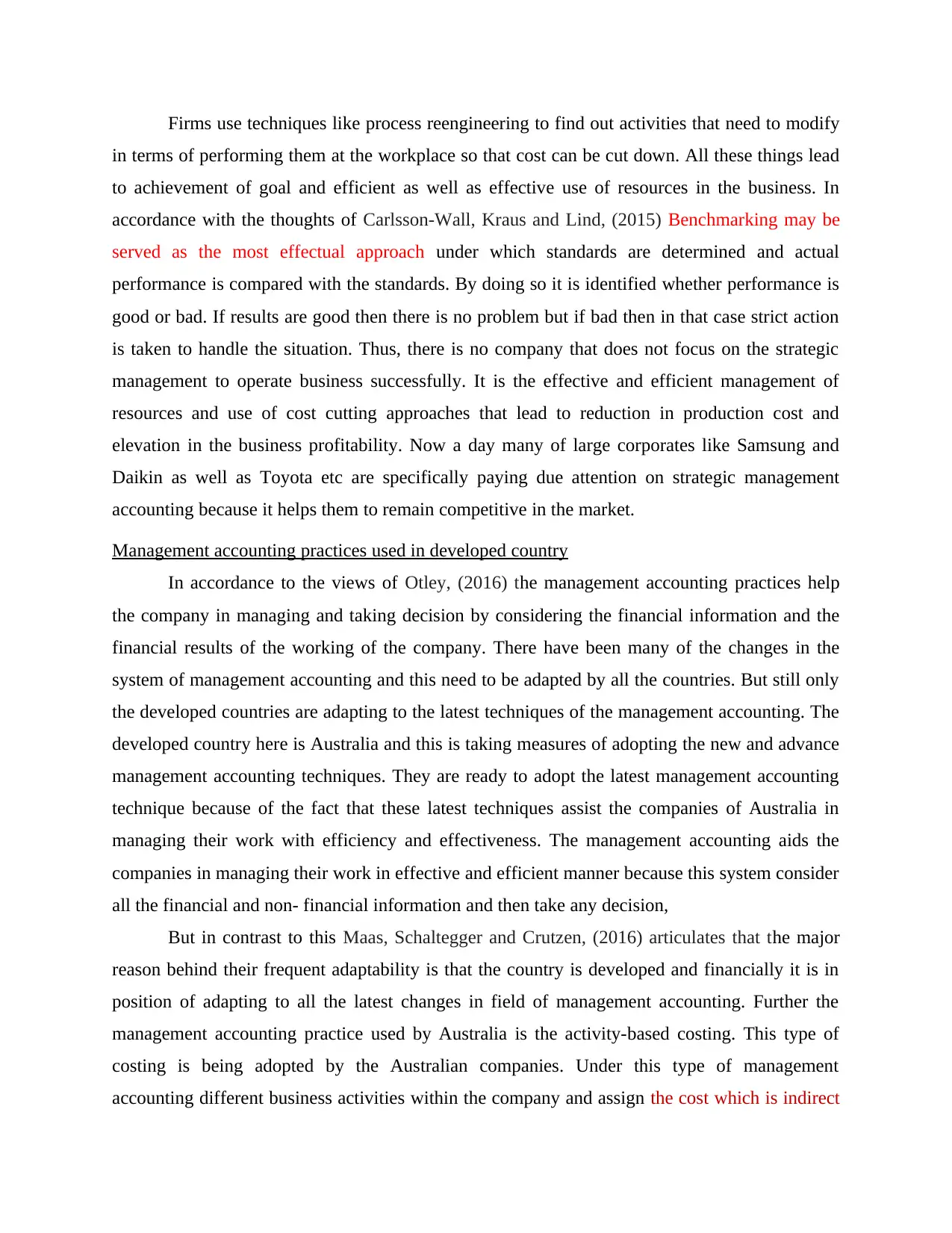
Firms use techniques like process reengineering to find out activities that need to modify
in terms of performing them at the workplace so that cost can be cut down. All these things lead
to achievement of goal and efficient as well as effective use of resources in the business. In
accordance with the thoughts of Carlsson-Wall, Kraus and Lind, (2015) Benchmarking may be
served as the most effectual approach under which standards are determined and actual
performance is compared with the standards. By doing so it is identified whether performance is
good or bad. If results are good then there is no problem but if bad then in that case strict action
is taken to handle the situation. Thus, there is no company that does not focus on the strategic
management to operate business successfully. It is the effective and efficient management of
resources and use of cost cutting approaches that lead to reduction in production cost and
elevation in the business profitability. Now a day many of large corporates like Samsung and
Daikin as well as Toyota etc are specifically paying due attention on strategic management
accounting because it helps them to remain competitive in the market.
Management accounting practices used in developed country
In accordance to the views of Otley, (2016) the management accounting practices help
the company in managing and taking decision by considering the financial information and the
financial results of the working of the company. There have been many of the changes in the
system of management accounting and this need to be adapted by all the countries. But still only
the developed countries are adapting to the latest techniques of the management accounting. The
developed country here is Australia and this is taking measures of adopting the new and advance
management accounting techniques. They are ready to adopt the latest management accounting
technique because of the fact that these latest techniques assist the companies of Australia in
managing their work with efficiency and effectiveness. The management accounting aids the
companies in managing their work in effective and efficient manner because this system consider
all the financial and non- financial information and then take any decision,
But in contrast to this Maas, Schaltegger and Crutzen, (2016) articulates that the major
reason behind their frequent adaptability is that the country is developed and financially it is in
position of adapting to all the latest changes in field of management accounting. Further the
management accounting practice used by Australia is the activity-based costing. This type of
costing is being adopted by the Australian companies. Under this type of management
accounting different business activities within the company and assign the cost which is indirect
in terms of performing them at the workplace so that cost can be cut down. All these things lead
to achievement of goal and efficient as well as effective use of resources in the business. In
accordance with the thoughts of Carlsson-Wall, Kraus and Lind, (2015) Benchmarking may be
served as the most effectual approach under which standards are determined and actual
performance is compared with the standards. By doing so it is identified whether performance is
good or bad. If results are good then there is no problem but if bad then in that case strict action
is taken to handle the situation. Thus, there is no company that does not focus on the strategic
management to operate business successfully. It is the effective and efficient management of
resources and use of cost cutting approaches that lead to reduction in production cost and
elevation in the business profitability. Now a day many of large corporates like Samsung and
Daikin as well as Toyota etc are specifically paying due attention on strategic management
accounting because it helps them to remain competitive in the market.
Management accounting practices used in developed country
In accordance to the views of Otley, (2016) the management accounting practices help
the company in managing and taking decision by considering the financial information and the
financial results of the working of the company. There have been many of the changes in the
system of management accounting and this need to be adapted by all the countries. But still only
the developed countries are adapting to the latest techniques of the management accounting. The
developed country here is Australia and this is taking measures of adopting the new and advance
management accounting techniques. They are ready to adopt the latest management accounting
technique because of the fact that these latest techniques assist the companies of Australia in
managing their work with efficiency and effectiveness. The management accounting aids the
companies in managing their work in effective and efficient manner because this system consider
all the financial and non- financial information and then take any decision,
But in contrast to this Maas, Schaltegger and Crutzen, (2016) articulates that the major
reason behind their frequent adaptability is that the country is developed and financially it is in
position of adapting to all the latest changes in field of management accounting. Further the
management accounting practice used by Australia is the activity-based costing. This type of
costing is being adopted by the Australian companies. Under this type of management
accounting different business activities within the company and assign the cost which is indirect
Paraphrase This Document
Need a fresh take? Get an instant paraphrase of this document with our AI Paraphraser
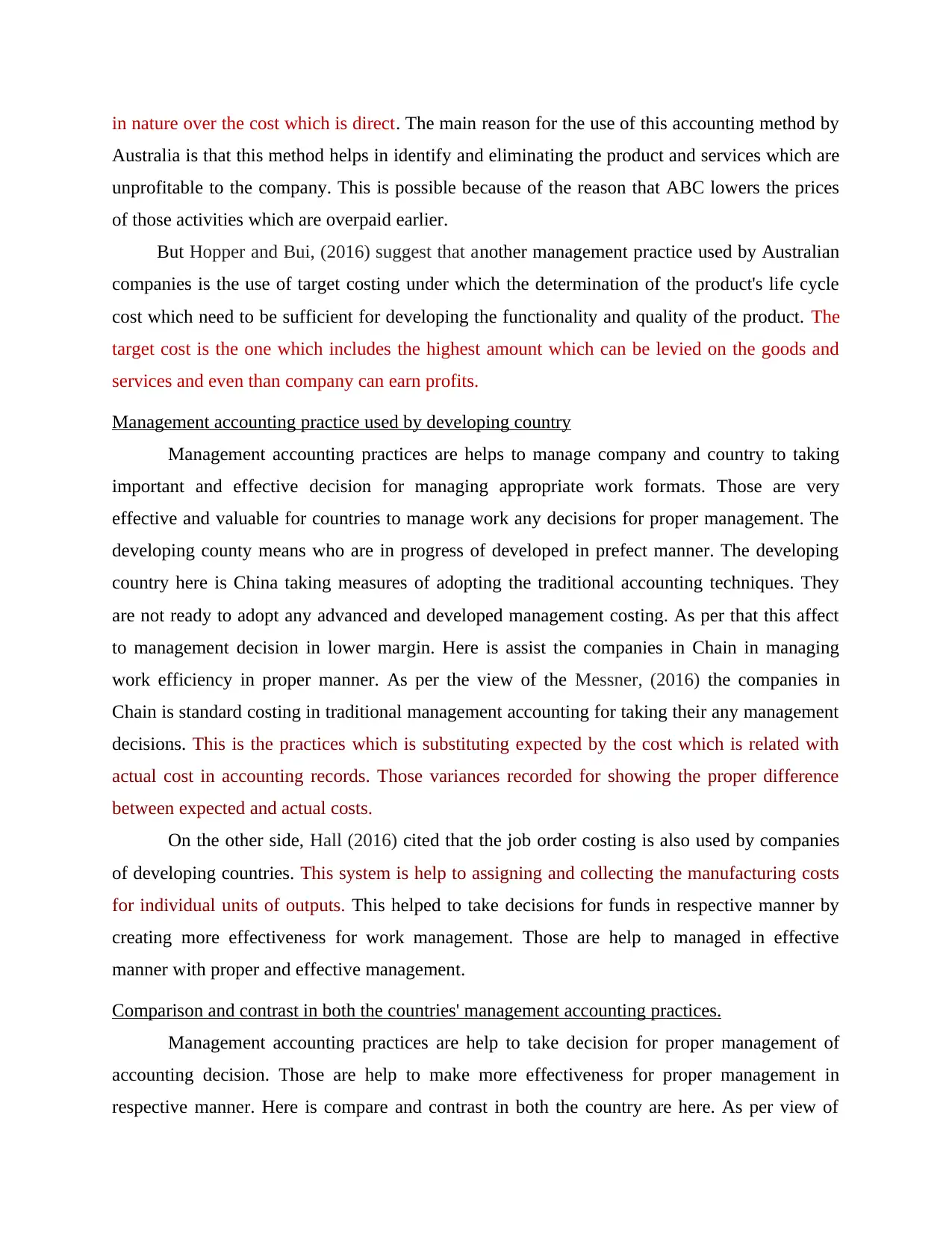
in nature over the cost which is direct. The main reason for the use of this accounting method by
Australia is that this method helps in identify and eliminating the product and services which are
unprofitable to the company. This is possible because of the reason that ABC lowers the prices
of those activities which are overpaid earlier.
But Hopper and Bui, (2016) suggest that another management practice used by Australian
companies is the use of target costing under which the determination of the product's life cycle
cost which need to be sufficient for developing the functionality and quality of the product. The
target cost is the one which includes the highest amount which can be levied on the goods and
services and even than company can earn profits.
Management accounting practice used by developing country
Management accounting practices are helps to manage company and country to taking
important and effective decision for managing appropriate work formats. Those are very
effective and valuable for countries to manage work any decisions for proper management. The
developing county means who are in progress of developed in prefect manner. The developing
country here is China taking measures of adopting the traditional accounting techniques. They
are not ready to adopt any advanced and developed management costing. As per that this affect
to management decision in lower margin. Here is assist the companies in Chain in managing
work efficiency in proper manner. As per the view of the Messner, (2016) the companies in
Chain is standard costing in traditional management accounting for taking their any management
decisions. This is the practices which is substituting expected by the cost which is related with
actual cost in accounting records. Those variances recorded for showing the proper difference
between expected and actual costs.
On the other side, Hall (2016) cited that the job order costing is also used by companies
of developing countries. This system is help to assigning and collecting the manufacturing costs
for individual units of outputs. This helped to take decisions for funds in respective manner by
creating more effectiveness for work management. Those are help to managed in effective
manner with proper and effective management.
Comparison and contrast in both the countries' management accounting practices.
Management accounting practices are help to take decision for proper management of
accounting decision. Those are help to make more effectiveness for proper management in
respective manner. Here is compare and contrast in both the country are here. As per view of
Australia is that this method helps in identify and eliminating the product and services which are
unprofitable to the company. This is possible because of the reason that ABC lowers the prices
of those activities which are overpaid earlier.
But Hopper and Bui, (2016) suggest that another management practice used by Australian
companies is the use of target costing under which the determination of the product's life cycle
cost which need to be sufficient for developing the functionality and quality of the product. The
target cost is the one which includes the highest amount which can be levied on the goods and
services and even than company can earn profits.
Management accounting practice used by developing country
Management accounting practices are helps to manage company and country to taking
important and effective decision for managing appropriate work formats. Those are very
effective and valuable for countries to manage work any decisions for proper management. The
developing county means who are in progress of developed in prefect manner. The developing
country here is China taking measures of adopting the traditional accounting techniques. They
are not ready to adopt any advanced and developed management costing. As per that this affect
to management decision in lower margin. Here is assist the companies in Chain in managing
work efficiency in proper manner. As per the view of the Messner, (2016) the companies in
Chain is standard costing in traditional management accounting for taking their any management
decisions. This is the practices which is substituting expected by the cost which is related with
actual cost in accounting records. Those variances recorded for showing the proper difference
between expected and actual costs.
On the other side, Hall (2016) cited that the job order costing is also used by companies
of developing countries. This system is help to assigning and collecting the manufacturing costs
for individual units of outputs. This helped to take decisions for funds in respective manner by
creating more effectiveness for work management. Those are help to managed in effective
manner with proper and effective management.
Comparison and contrast in both the countries' management accounting practices.
Management accounting practices are help to take decision for proper management of
accounting decision. Those are help to make more effectiveness for proper management in
respective manner. Here is compare and contrast in both the country are here. As per view of
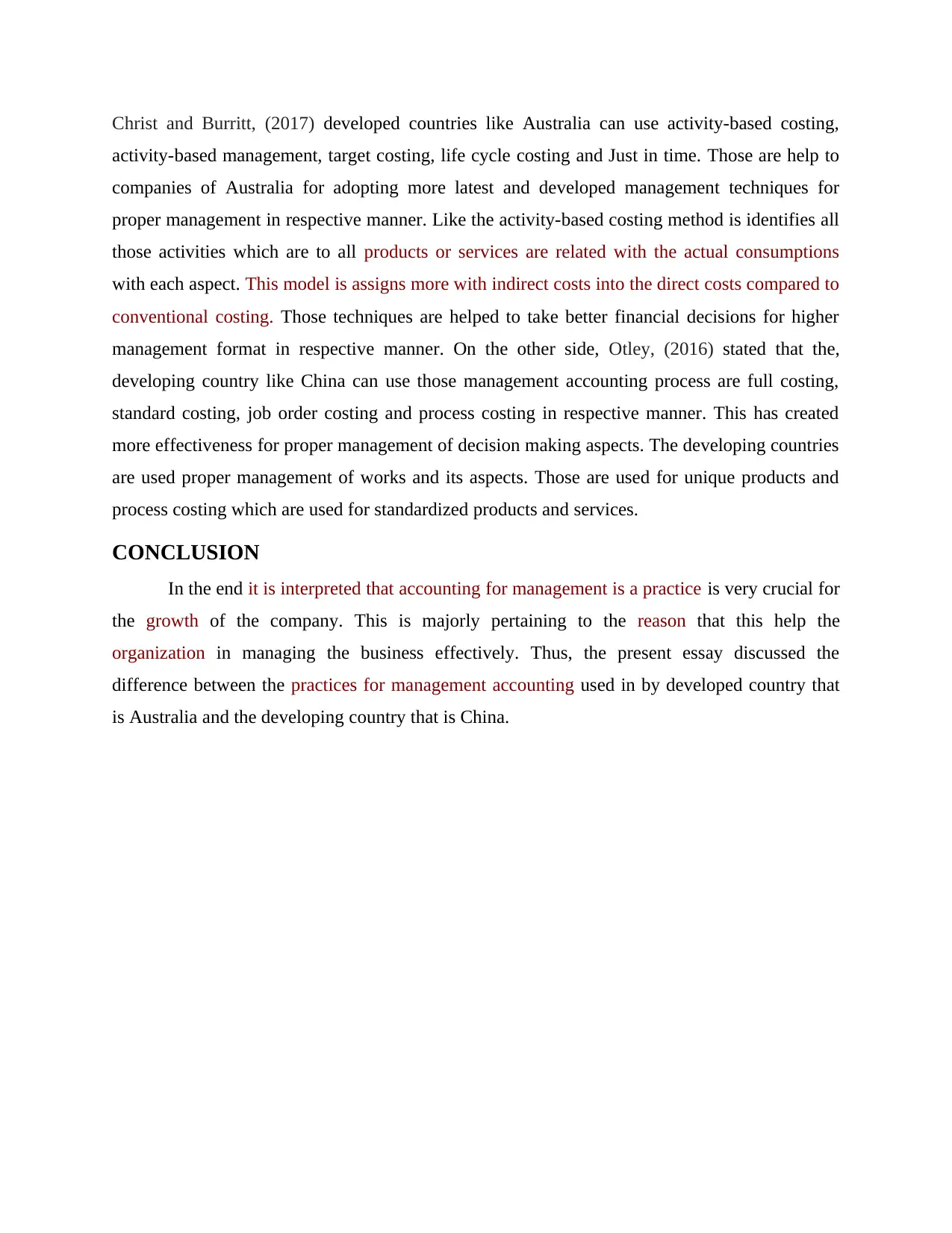
Christ and Burritt, (2017) developed countries like Australia can use activity-based costing,
activity-based management, target costing, life cycle costing and Just in time. Those are help to
companies of Australia for adopting more latest and developed management techniques for
proper management in respective manner. Like the activity-based costing method is identifies all
those activities which are to all products or services are related with the actual consumptions
with each aspect. This model is assigns more with indirect costs into the direct costs compared to
conventional costing. Those techniques are helped to take better financial decisions for higher
management format in respective manner. On the other side, Otley, (2016) stated that the,
developing country like China can use those management accounting process are full costing,
standard costing, job order costing and process costing in respective manner. This has created
more effectiveness for proper management of decision making aspects. The developing countries
are used proper management of works and its aspects. Those are used for unique products and
process costing which are used for standardized products and services.
CONCLUSION
In the end it is interpreted that accounting for management is a practice is very crucial for
the growth of the company. This is majorly pertaining to the reason that this help the
organization in managing the business effectively. Thus, the present essay discussed the
difference between the practices for management accounting used in by developed country that
is Australia and the developing country that is China.
activity-based management, target costing, life cycle costing and Just in time. Those are help to
companies of Australia for adopting more latest and developed management techniques for
proper management in respective manner. Like the activity-based costing method is identifies all
those activities which are to all products or services are related with the actual consumptions
with each aspect. This model is assigns more with indirect costs into the direct costs compared to
conventional costing. Those techniques are helped to take better financial decisions for higher
management format in respective manner. On the other side, Otley, (2016) stated that the,
developing country like China can use those management accounting process are full costing,
standard costing, job order costing and process costing in respective manner. This has created
more effectiveness for proper management of decision making aspects. The developing countries
are used proper management of works and its aspects. Those are used for unique products and
process costing which are used for standardized products and services.
CONCLUSION
In the end it is interpreted that accounting for management is a practice is very crucial for
the growth of the company. This is majorly pertaining to the reason that this help the
organization in managing the business effectively. Thus, the present essay discussed the
difference between the practices for management accounting used in by developed country that
is Australia and the developing country that is China.
⊘ This is a preview!⊘
Do you want full access?
Subscribe today to unlock all pages.

Trusted by 1+ million students worldwide
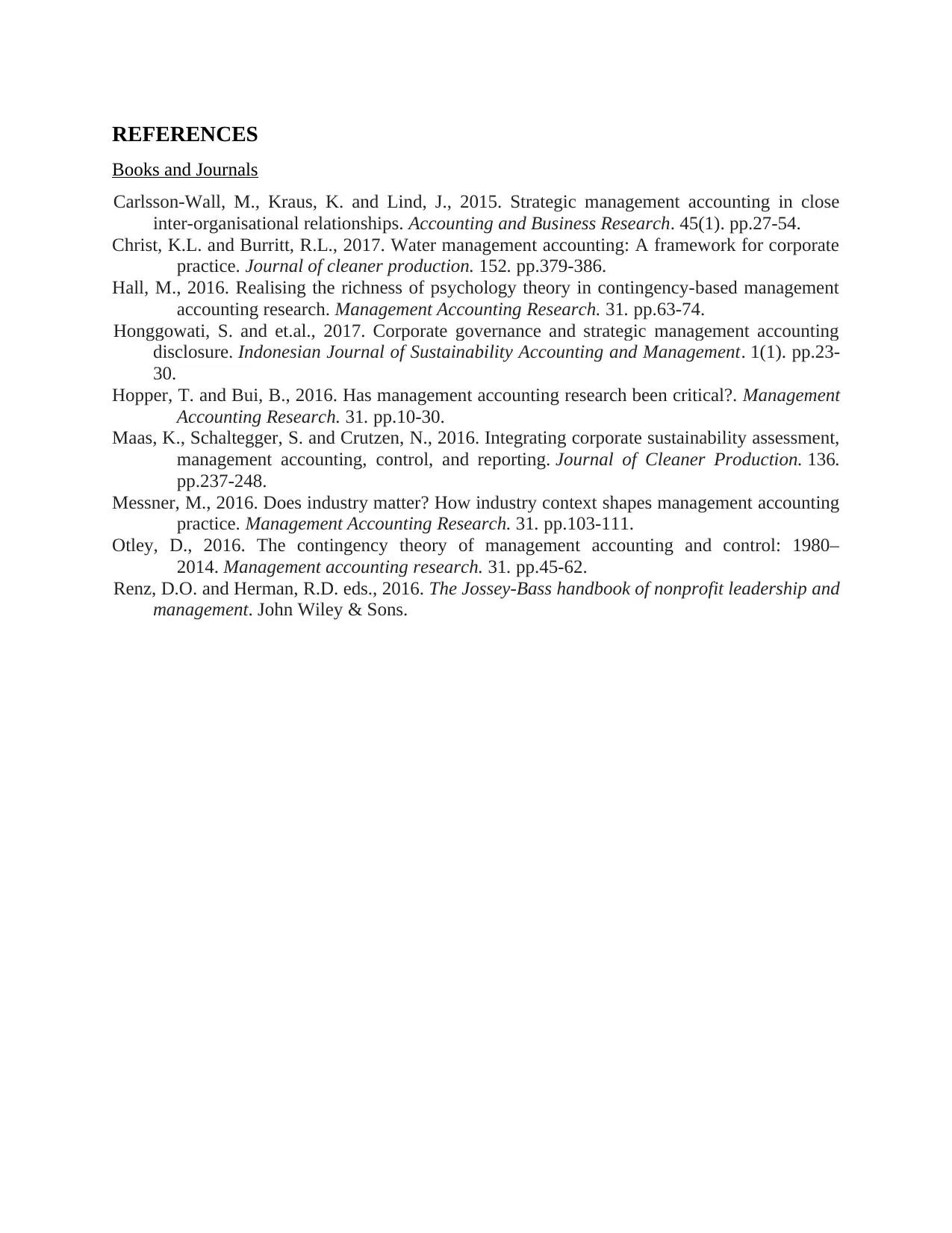
REFERENCES
Books and Journals
Carlsson-Wall, M., Kraus, K. and Lind, J., 2015. Strategic management accounting in close
inter-organisational relationships. Accounting and Business Research. 45(1). pp.27-54.
Christ, K.L. and Burritt, R.L., 2017. Water management accounting: A framework for corporate
practice. Journal of cleaner production. 152. pp.379-386.
Hall, M., 2016. Realising the richness of psychology theory in contingency-based management
accounting research. Management Accounting Research. 31. pp.63-74.
Honggowati, S. and et.al., 2017. Corporate governance and strategic management accounting
disclosure. Indonesian Journal of Sustainability Accounting and Management. 1(1). pp.23-
30.
Hopper, T. and Bui, B., 2016. Has management accounting research been critical?. Management
Accounting Research. 31. pp.10-30.
Maas, K., Schaltegger, S. and Crutzen, N., 2016. Integrating corporate sustainability assessment,
management accounting, control, and reporting. Journal of Cleaner Production. 136.
pp.237-248.
Messner, M., 2016. Does industry matter? How industry context shapes management accounting
practice. Management Accounting Research. 31. pp.103-111.
Otley, D., 2016. The contingency theory of management accounting and control: 1980–
2014. Management accounting research. 31. pp.45-62.
Renz, D.O. and Herman, R.D. eds., 2016. The Jossey-Bass handbook of nonprofit leadership and
management. John Wiley & Sons.
Books and Journals
Carlsson-Wall, M., Kraus, K. and Lind, J., 2015. Strategic management accounting in close
inter-organisational relationships. Accounting and Business Research. 45(1). pp.27-54.
Christ, K.L. and Burritt, R.L., 2017. Water management accounting: A framework for corporate
practice. Journal of cleaner production. 152. pp.379-386.
Hall, M., 2016. Realising the richness of psychology theory in contingency-based management
accounting research. Management Accounting Research. 31. pp.63-74.
Honggowati, S. and et.al., 2017. Corporate governance and strategic management accounting
disclosure. Indonesian Journal of Sustainability Accounting and Management. 1(1). pp.23-
30.
Hopper, T. and Bui, B., 2016. Has management accounting research been critical?. Management
Accounting Research. 31. pp.10-30.
Maas, K., Schaltegger, S. and Crutzen, N., 2016. Integrating corporate sustainability assessment,
management accounting, control, and reporting. Journal of Cleaner Production. 136.
pp.237-248.
Messner, M., 2016. Does industry matter? How industry context shapes management accounting
practice. Management Accounting Research. 31. pp.103-111.
Otley, D., 2016. The contingency theory of management accounting and control: 1980–
2014. Management accounting research. 31. pp.45-62.
Renz, D.O. and Herman, R.D. eds., 2016. The Jossey-Bass handbook of nonprofit leadership and
management. John Wiley & Sons.
1 out of 7
Related Documents
Your All-in-One AI-Powered Toolkit for Academic Success.
+13062052269
info@desklib.com
Available 24*7 on WhatsApp / Email
![[object Object]](/_next/static/media/star-bottom.7253800d.svg)
Unlock your academic potential
Copyright © 2020–2025 A2Z Services. All Rights Reserved. Developed and managed by ZUCOL.





